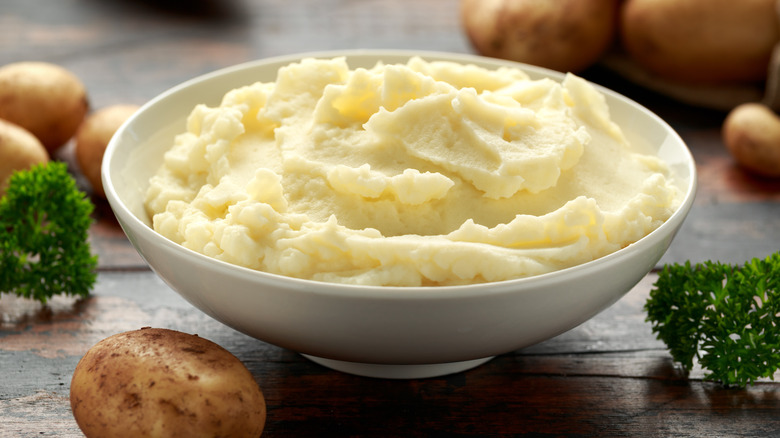The Salty Tip You Need For Making Better Mashed Potatoes
Although mashed potatoes can be a great side to cleanse your palate in between bites of other foods — or just a delicious comfort food on their own — no one wants a mouthful of bland food. To make sure you're creating the most flavorful side dish, you'll want to add in a few seasonings. Salt is one of the most common additions to mashed potatoes. But if you really want to make them as flavorful as possible, you should be boiling your potatoes in salted milk.
The milk will make the potatoes extra creamy when you mash them, and the salt is an important part of seasoning the food. Potatoes pretty easily take on the flavors of things that they cook with. While quite a few mashed potato recipes call for potatoes to be boiled in plain old water, swapping water with salted milk will give the dish an extra element of creamy deliciousness.
The salted milk might even help the potatoes hold onto their full flavor. When potatoes are boiled in water, that flavor might be reduced and lost once the pot is drained. But since salt and milk are commonly used to flavor the side dish anyway, that potato flavor can be retained if the spuds are cooked directly in the salted milk mixture.
Tips for cooking potatoes in salted milk
You'll first want to peel off the outer skin and cut the potatoes, then add them into a pot on the stovetop. Then, mix your desired amount of salt into some milk, and add enough of the salted milk to cover the potatoes in the pot. If you want to use less milk, try cooking the potatoes in a large pan — the added space will let you spread out the spuds, ensuring every piece is evenly coated in the salted milk.
Once the potatoes are fully covered, allow the salted milk to come to a simmer so the potatoes can cook through. As the spuds heat up and soften, they'll be seasoned with the salt internally, and they'll take on that extra creamy texture, thanks to the milk. (As an added bonus, all the prep work can be done in the same pan, making less clean-up in the kitchen!)
As potatoes cook, the steam produced inside the spuds expands the inner starch granules, according to Science of Cooking. This expansion allows space for the potatoes to take in the salted milk. When the potatoes have softened, they retain that flavor, ensuring that every bite is seasoned, creamy, and delicious.
The potatoes will take on other flavors, too
Once your potatoes have completely cooked, you can strain the liquid out and mash them up. But if you really want to amplify the flavor of your mashed potatoes, make sure to save some of that salted milk, instead of just pouring it down the drain. If your potatoes aren't creamy enough after being mashed, you can always add some salted milk back in gradually, mixing it with the mashed potatoes until you achieve your desired consistency.
Once you've made the perfect creamy, salted potatoes, you can add in other seasonings. A little extra salt or some pepper are pretty common additions. You could even add some garlic to the mix — for some deliciously garlicky mashed potatoes, mix a freshly-minced garlic clove into the potatoes right before mashing them.
The next time you want to whip up a batch of creamy mashed potatoes, cook your potatoes in salted milk instead of water — your taste buds will thank you.


